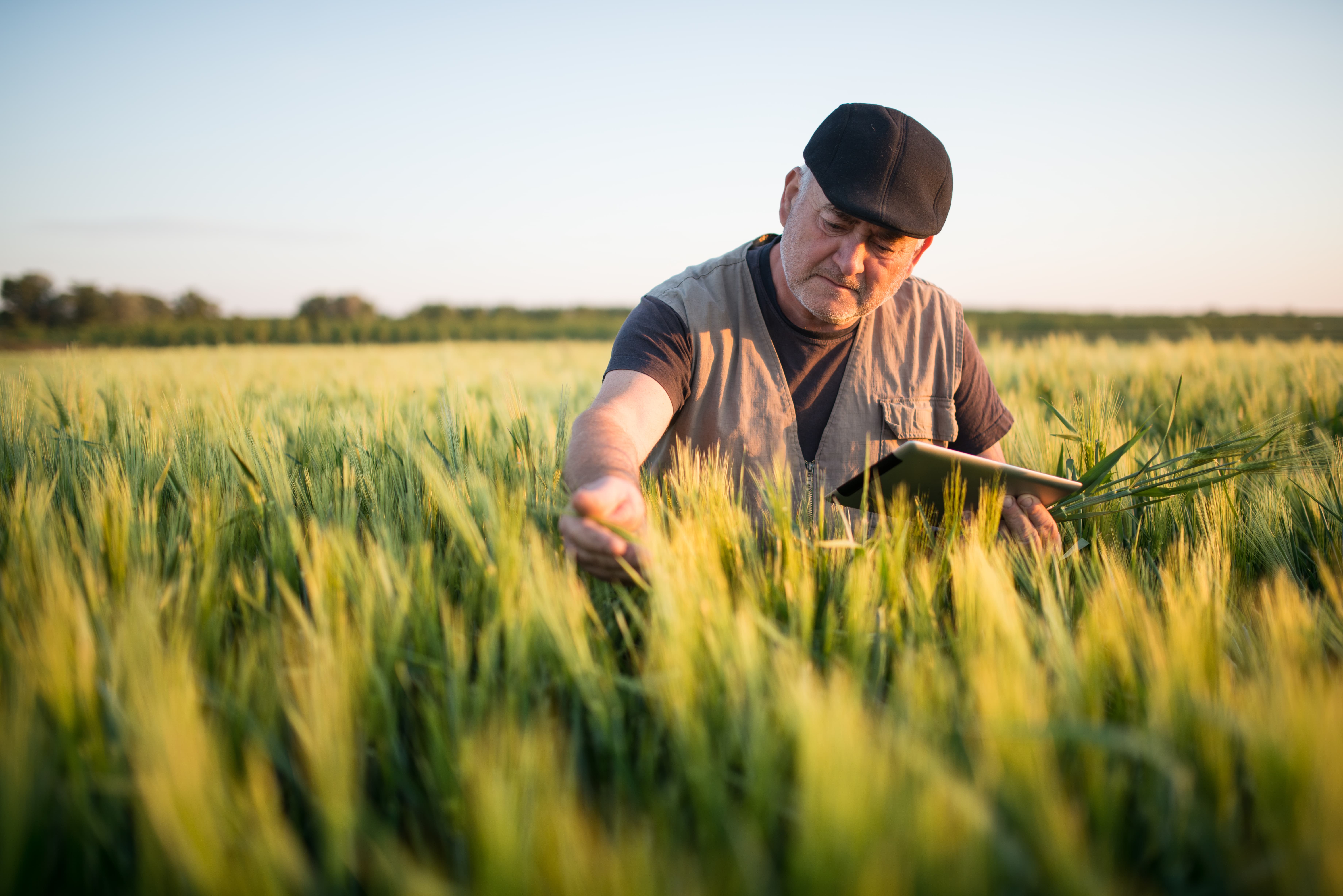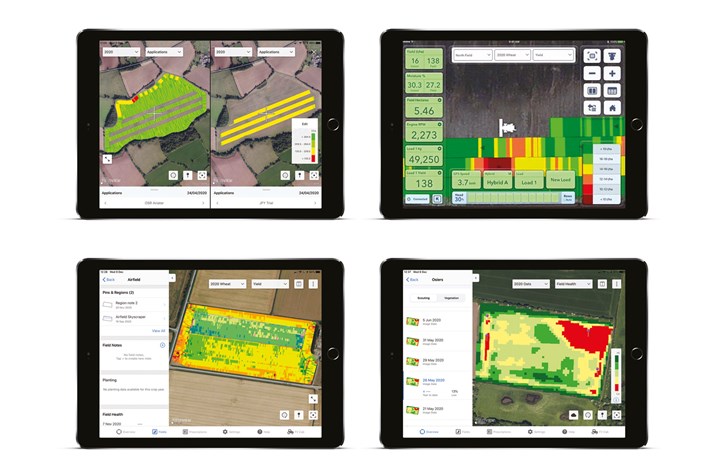The value of data and of small gains added together has caught on with farmers. Utilising digital farming technology can bring value to farmers through effective data capture and evaluation, improving crop performance and strategic insight with the move to a sustainable future.


After only moderate Olympic success prior to 2008, Team GB has since become a dominant force in track cycling, with medal hauls in Beijing, London and Rio. The continued success is largely down to informed decisions based on data and a “marginal gains” philosophy, where small gains added together provide a winning edge. The extent of data gathered is extraordinary; from bike aerodynamics, rider position and diet, to bed mattresses and pillows for sleep posture.
If we apply this same philosophy to farming, there’s plenty for farmers to gain. One such farmer is Andrew Ward of Glebe Farm, Leadenham, who has data covering crop, soil, hours, and fuel, all costed out across different tractor and implement combinations.
Some may view it as obsessive, but to Mr Ward it is good business practice, where more information allows better decision making. But he has never been able to capture the same depth of data to assist with crop and management decision making, until now.
Various platforms provide data capture, but Mr Ward particularly likes Climate FieldView’s instant data availability, and easy interpretation. He has created six colour-coded yield bands for crop performance benchmarking. Using a freehand drawing tool, he selects areas from the field of Shabras and Skyscraper. The field turns to shades of green, yellow and red representing the variability in yield, with mean yield and moisture data also displayed for the area highlighted.
Like most farms, Mr Ward has challenging field areas. By refining yield parameters and search criteria he focuses on under performing areas.
“The level of detail shows me the extent of the problem, which could be down to factors such as drainage, soil type or nutrients. The data helps me identify and rectify problem areas quicker, or highlight whether these would be better put to Entry Level Stewardship or alternative uses.”
He has used Climate FieldView to capture data on different min-till drilling options and evaluate pre-em sprays for black-grass control.
His next evaluation is likely to be variable rate seed or fertiliser. The platform makes it simple to draw data from plots, tramlines or combine passes. He will be able to compare yield data from across the field and correlate that precisely to seed or fertiliser rate.
Aiding that is split-screen functionality, which lets him more easily compare field data over two seasons. Seeing consistent yield patterns will allow him to identify underlying soil issues more effectively. Field health data captured by satellites offers another layer of detail.
Regular vegetative maps add insight into crop performance, but also have an immediate value. Last season, the field health maps highlighted observed variations in crop biomass in a field of spring oats. This was due to thin patches throughout the field where crops never really got going. Locating these was easy, as he dropped scouting pins into the maps and his phone took him right to those spots.
“I can be doing something else but still see realtime data from the combine. Everything else was straightforward too. I just downloaded the app and logged in.”
The drive also records field operation data, including variety, application rate, field position, speed and elevation. Being cloud-based means data can be accessed any time by anyone authorised to do so.
Like Mr Ward, he uses on-farm trials to see what works for his land and location. Climate FieldView was first used to record data from a Bayer Judge For Yourself oilseed rape fungicide trial. For him, the platform eliminates compromised trial data.
A benefit of Climate FieldView was when harvesting the oilseed rape trial, he knew precisely where each plot started and finished. He also likes the ability to view real time data from cab, office or remotely via his iPad, and the simplicity of data evaluation via colour-coded yield parameters.
“I can visualise field yield maps with application rates from various implements. Being able to correlate variable rate applications with yield outcome is an obvious attraction with our precision farming approach.”
Mr Williamson has seen immediate benefits from field health tools. He used biomass maps generated by the platform to tailor oilseed rape glyphosate desiccation rates. And it could have a key role with his target of 25,000 grains/m² for winter wheat. “These will help identify GAI levels across a field. As it will with weed control, as greater biomass might not be a healthy wheat crop.”
For him, Climate FieldView shows real promise, and he hopes in time it will link up with recording software. With his interest in precision farming, it has a key role in capturing data to refine their agronomic practice. Further ahead, the platform will be valuable in helping them shape farm strategy to meet sustainable objectives.
Accessing farm data regardless of location and time is certainly a “huge benefit” in today’s lifestyle.
Discover the potential of Bayer’s Climate FieldView for yourself.


After only moderate Olympic success prior to 2008, Team GB has since become a dominant force in track cycling, with medal hauls in Beijing, London and Rio. The continued success is largely down to informed decisions based on data and a “marginal gains” philosophy, where small gains added together provide a winning edge. The extent of data gathered is extraordinary; from bike aerodynamics, rider position and diet, to bed mattresses and pillows for sleep posture.
If we apply this same philosophy to farming, there’s plenty for farmers to gain. One such farmer is Andrew Ward of Glebe Farm, Leadenham, who has data covering crop, soil, hours, and fuel, all costed out across different tractor and implement combinations.
Some may view it as obsessive, but to Mr Ward it is good business practice, where more information allows better decision making. But he has never been able to capture the same depth of data to assist with crop and management decision making, until now.
Introducing Bayer’s Climate FieldView
Mr Ward is in his second season trialling Bayer’s Climate FieldView, which he sees as a potential gamechanger. It paid dividends with harvest data last season, revealing big differences in the performance of late-sown wheat in light soils.

|
Various platforms provide data capture, but Mr Ward particularly likes Climate FieldView’s instant data availability, and easy interpretation. He has created six colour-coded yield bands for crop performance benchmarking. Using a freehand drawing tool, he selects areas from the field of Shabras and Skyscraper. The field turns to shades of green, yellow and red representing the variability in yield, with mean yield and moisture data also displayed for the area highlighted.
Like most farms, Mr Ward has challenging field areas. By refining yield parameters and search criteria he focuses on under performing areas.
“The level of detail shows me the extent of the problem, which could be down to factors such as drainage, soil type or nutrients. The data helps me identify and rectify problem areas quicker, or highlight whether these would be better put to Entry Level Stewardship or alternative uses.”
Using Climate FieldView for farm trials
Mr Ward’s ‘continuous development’ philosophy means he undertakes numerous on-farm trials, and feels Climate FieldView takes on-farm evaluation to new levels.He has used Climate FieldView to capture data on different min-till drilling options and evaluate pre-em sprays for black-grass control.
His next evaluation is likely to be variable rate seed or fertiliser. The platform makes it simple to draw data from plots, tramlines or combine passes. He will be able to compare yield data from across the field and correlate that precisely to seed or fertiliser rate.
Aiding that is split-screen functionality, which lets him more easily compare field data over two seasons. Seeing consistent yield patterns will allow him to identify underlying soil issues more effectively. Field health data captured by satellites offers another layer of detail.
Regular vegetative maps add insight into crop performance, but also have an immediate value. Last season, the field health maps highlighted observed variations in crop biomass in a field of spring oats. This was due to thin patches throughout the field where crops never really got going. Locating these was easy, as he dropped scouting pins into the maps and his phone took him right to those spots.
Accessing cloud-based data quickly with Climate FieldView
Mr Ward first used the Climate FieldView Drive with his New Holland combine and was pleasantly surprised by how quickly the data started coming back after he plugged it in.“I can be doing something else but still see realtime data from the combine. Everything else was straightforward too. I just downloaded the app and logged in.”
The drive also records field operation data, including variety, application rate, field position, speed and elevation. Being cloud-based means data can be accessed any time by anyone authorised to do so.
Trial success on Shropshire farm
Collecting and sharing field operation data is an attraction of Climate FieldView for Shropshire farmer Andrew Williamson, of Upper Overton Farm. He undertakes field operations for neighbours and can send reports to them and their agronomist instantly.Like Mr Ward, he uses on-farm trials to see what works for his land and location. Climate FieldView was first used to record data from a Bayer Judge For Yourself oilseed rape fungicide trial. For him, the platform eliminates compromised trial data.
A benefit of Climate FieldView was when harvesting the oilseed rape trial, he knew precisely where each plot started and finished. He also likes the ability to view real time data from cab, office or remotely via his iPad, and the simplicity of data evaluation via colour-coded yield parameters.
“I can visualise field yield maps with application rates from various implements. Being able to correlate variable rate applications with yield outcome is an obvious attraction with our precision farming approach.”
Mr Williamson has seen immediate benefits from field health tools. He used biomass maps generated by the platform to tailor oilseed rape glyphosate desiccation rates. And it could have a key role with his target of 25,000 grains/m² for winter wheat. “These will help identify GAI levels across a field. As it will with weed control, as greater biomass might not be a healthy wheat crop.”
For him, Climate FieldView shows real promise, and he hopes in time it will link up with recording software. With his interest in precision farming, it has a key role in capturing data to refine their agronomic practice. Further ahead, the platform will be valuable in helping them shape farm strategy to meet sustainable objectives.
Accessing farm data regardless of location and time is certainly a “huge benefit” in today’s lifestyle.
Discover the potential of Bayer’s Climate FieldView for yourself.





